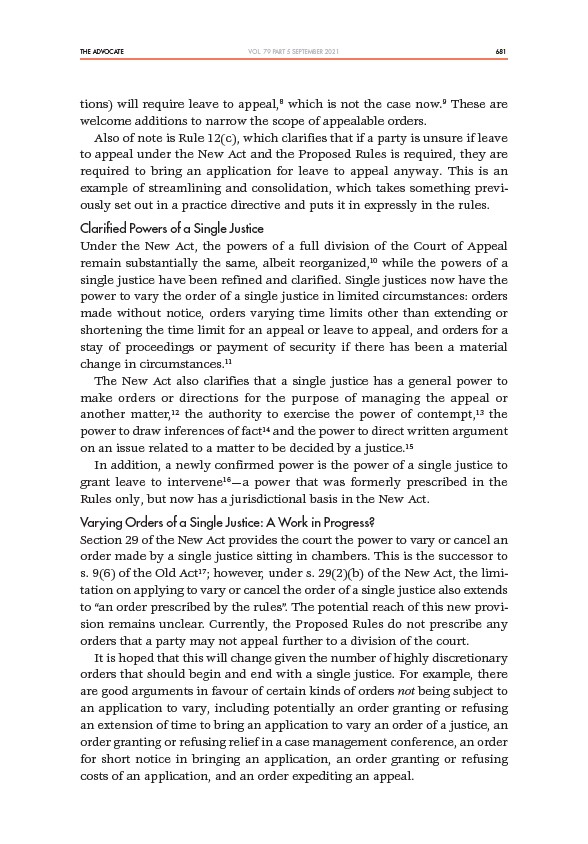
THE ADVOCATE 681
VOL. 79 PART 5 SEPTEMBER 2021
tions) will require leave to appeal,8 which is not the case now.9 These are
welcome additions to narrow the scope of appealable orders.
Also of note is Rule 12(c), which clarifies that if a party is unsure if leave
to appeal under the New Act and the Proposed Rules is required, they are
required to bring an application for leave to appeal anyway. This is an
example of streamlining and consolidation, which takes something previously
set out in a practice directive and puts it in expressly in the rules.
Clarified Powers of a Single Justice
Under the New Act, the powers of a full division of the Court of Appeal
remain substantially the same, albeit reorganized,10 while the powers of a
single justice have been refined and clarified. Single justices now have the
power to vary the order of a single justice in limited circumstances: orders
made without notice, orders varying time limits other than extending or
shortening the time limit for an appeal or leave to appeal, and orders for a
stay of proceedings or payment of security if there has been a material
change in circumstances.11
The New Act also clarifies that a single justice has a general power to
make orders or directions for the purpose of managing the appeal or
another matter,12 the authority to exercise the power of contempt,13 the
power to draw inferences of fact14 and the power to direct written argument
on an issue related to a matter to be decided by a justice.15
In addition, a newly confirmed power is the power of a single justice to
grant leave to intervene16—a power that was formerly prescribed in the
Rules only, but now has a jurisdictional basis in the New Act.
Varying Orders of a Single Justice: A Work in Progress?
Section 29 of the New Act provides the court the power to vary or cancel an
order made by a single justice sitting in chambers. This is the successor to
s. 9(6) of the Old Act17; however, under s. 29(2)(b) of the New Act, the limitation
on applying to vary or cancel the order of a single justice also extends
to “an order prescribed by the rules”. The potential reach of this new provision
remains unclear. Currently, the Proposed Rules do not prescribe any
orders that a party may not appeal further to a division of the court.
It is hoped that this will change given the number of highly discretionary
orders that should begin and end with a single justice. For example, there
are good arguments in favour of certain kinds of orders not being subject to
an application to vary, including potentially an order granting or refusing
an extension of time to bring an application to vary an order of a justice, an
order granting or refusing relief in a case management conference, an order
for short notice in bringing an application, an order granting or refusing
costs of an application, and an order expediting an appeal.